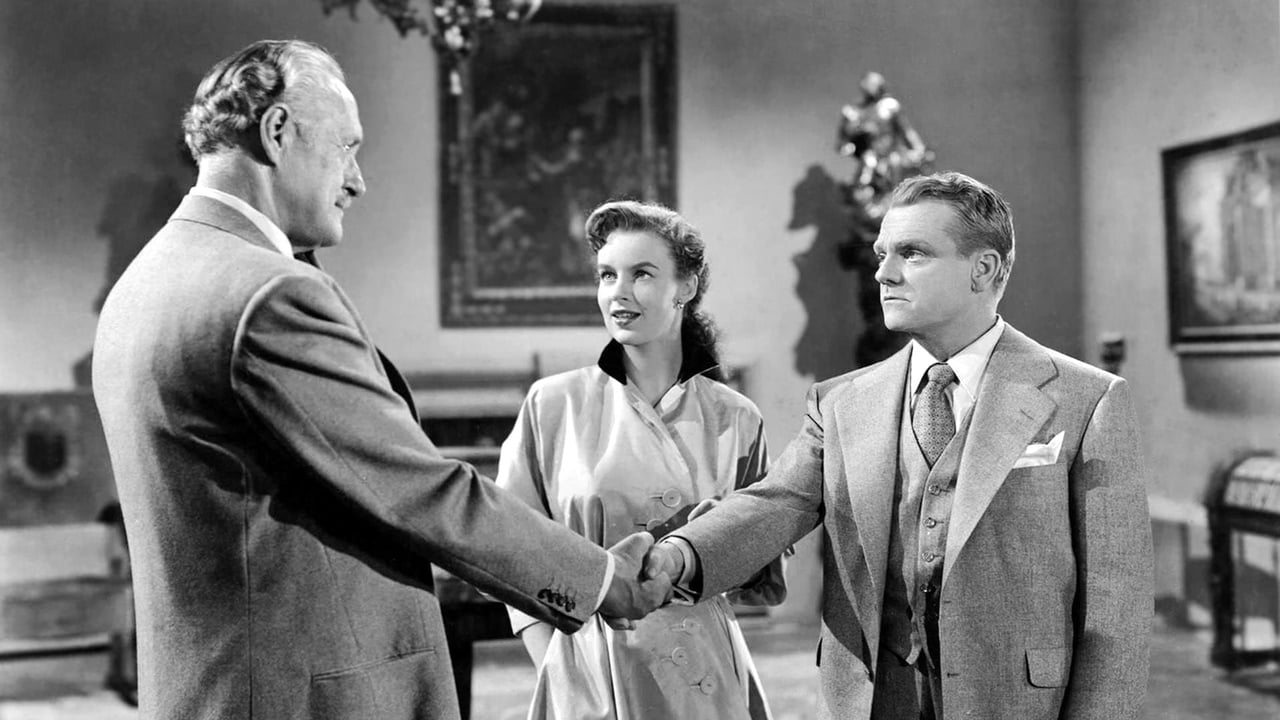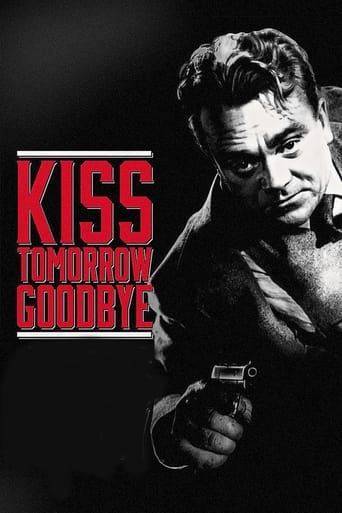Laikals
The greatest movie ever made..!
CommentsXp
Best movie ever!
Aedonerre
I gave this film a 9 out of 10, because it was exactly what I expected it to be.
Invaderbank
The film creates a perfect balance between action and depth of basic needs, in the midst of an infertile atmosphere.
radiobirdma
"History repeats itself, first as tragedy, then as farce" -- the famous Marx quote also counts for Jimmy Cagney's last gangster movie, a lackluster rehash of his 30s screen persona and classic Cagney stuff, the legendary grapefruit scene from The Public Enemy now transformed into a leaden homage with Barbara Payton tossing a cup of coffee at Cagney, who has -- I hate to say it -- lost his magic, the dancer elegance, the energetic body language, the aggressive upstart aura. While White Heat from the previous year captures Cagney as a completely berserk character, a distorted middle-age mirror image still breathing the intensity of youth, Kiss Tomorrow Goodbye merely reflects the portrait of the artist as his depleted doppelganger. Director Gordon Douglas can't hold a candle to Raoul Walsh, the production value looks more like Poverty Row than Warner Bros., the script is clumsy, and Cagney walks through this 35 mm swan song like he's anticipating those legendary words uttered by Elvis five years later in the opening of Milkcow Blues: "Hold it, fellas. That don't move me. Let's get real, real gone."
dglink
Six men and one woman are on trial, and the prosecutor tells the jury that each one is evil. The camera slowly pans past the group, which includes several veteran character actors, while the prosecutor says that an eighth defendant should be on trial with them. The first witness is then called from that group, and as he begins to testify, the story flashes back to a prison scene. The eighth person is likely James Cagney, who reprises his iconic gangster persona in "Kiss Tomorrow Goodbye." However, the film and his performance are less engaging than "White Heat" made only a year earlier. Although still a charismatic actor, Cagney is in a mid-career limbo; past his prime as a young tough and prior to his re-emergence as a distinguished elder character actor.Unlike his Cody Jarrett in "White Heat," at age 51, Cagney is visibly too old for the part of Ralph Cotter, and his age is a factor in the film's disappointment. The two young women who play Cagney's romantic interests are young enough to be his daughters, and the love scenes between them lack any chemistry, spark, or believability. Cagney's appeal to the two young women, especially the reckless young heiress, is mystifying, and, when her father addresses Cagney as "young man," viewers will question the man's eyesight. However, the tougher grittier scenes, planning heists or conspiring to entrap corrupt cops, evoke some of the early Warner Brothers gangster epics that featured Cagney, Robinson, and Muni at their best.Unfortunately, Harry Brown's screenplay, from a novel of the same title by Horace McCoy, often lacks credibility. The heists seem unplanned, casual, and even sloppy. One robbery occurs in broad daylight at a neighborhood grocery, where the criminals regularly shop; the robbers use no disguises, yet, incredibly, a witness after wards claims to have seen nothing but the guns, and other witnesses, who clearly saw the men, are not even questioned. Equally astounding, Brown evidently thinks that feigning a fever is enough to fool prison guards and successfully break out. While the supporting players include such stalwarts as Ward Bond, Luther Adler, and Barton MacLane, the plot is not worthy of their talents. Character motivations are often unexplained or non-existent. Arguably the film's worst performance is given by Barbara Payton as Holiday Carleton, a suitably pulp-fiction character name; her histrionics and mood swings are overly dramatic and unbelievable, to be polite. Produced by Cagney's brother, William, and directed by Gordon Douglas, the film has the look of a modestly budgeted programmer, the bottom half of a double bill. While not really bad, "Kiss Tomorrow Goodbye," despite a great pulp-fiction title, is just not good enough; certainly not good enough to be the vehicle for a great star, even one beyond his prime. Viewers may want to revisit "White Heat" instead.
nomoons11
Man if this character Cagney plays doesn't appear to have the same look, feel and over the topness of his character in White Heat, I don't know what other film does.This was a pretty good but it's not in the same breath as White Heat. Cagney plays a guy who busts outta prison and gets together with a few corrupt officials and regulars to commit robberies for fast dough. In this we meet his helper in his escape, Barbara Payton and the driver. They get involved with corrupt cops and lawyers whoever else to get ahead. The character Cagney plays so closely resembles Cody Jarrett that just by me mentioning it you'll immediately know what your in for. Cagney goes through this film doing whatever he wants to whoever without batting an eyelash. The best part is how all the people around him react. One comment on the time this film was made, late 40's early 50's, there probably wasn't an "institute for cosmic consciousness" in the south. How do we know this was in the south? Well, I know of know other place in the US that had chain gangs(like the one Cagney escapes from). In this film you see a corrupt ex-mob guy who's running this "new-age" place and I can tell ya folks, ain't know way that place would have existed in the south in that day and time. They would have run them outta the place. Another little fun nugget? Take a look at the end scene where Cagney falls after being shot. If you look close on the left hand side of the screen, you'll see a crew members foot come into the frame for just a second. LoL now that's quality editing.Looking for over-the-topness in your films? This one should suit you just fine. It was pretty obvious Cagney jumped on this one cause of how well White Heat previously. It works but don't expect White Heat.
HeathCliff-2
I'm stunned. I just finished watching this movie, and can't believe 1) how incredible it was; 2) that I knew nothing about this film, and that it is a totally hidden forgotten overlooked minor classic. I thought I knew or had heard of every major or almost-major film from the mid 30s through the 50s, but this came as a shock. There's no point comparing it to White Heat, which is in a class all by itself, for some justifiable memorable moments, notably the finale on the oil tank. But removing that legendary scene from the equation, this film is almost as good, with many scenes that stand out. The casting is flawless, and it has its own specialness, not the least (besides an always-brilliant Cagney), are the two love-interests, both pitch-perfect - Barbara Payton as the corrupted blonde, Helene Carter is the rich spoiled debutante. Notably, the script is devoid of cliché, often surprising, witty and anachronistically violent following the pathological gangster Cagney on a lawless tear as he breaks out of prison and afterwards. Two scenes, among many, jump out from the norm for their style, as often happened in a Hitchcock film: Payton throwing coffee, sugar, etc at Cagney, during a spat; and Cagney pushing Carter's foot further on the pedal in a duel of power while she drives her sportscar. The movie was complete surprise, and quite wonderful.

